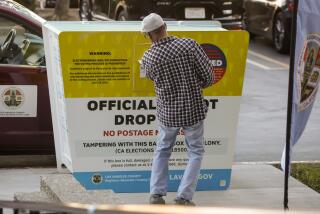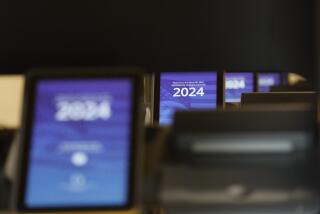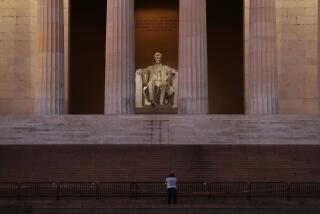National Voter Registration Day: This campaign is about voters
Fueled by celebrities and a host of organizations, volunteers across the nation took to the streets -- and, more important, to the Web -- on Tuesday to urge people to register to vote. The avowedly nonpartisan campaign goes to the heart of one of the key factors in any election: Who gets to decide?
The campaign, dubbed National Voter Registration Day, is backed by trade unions, human rights groups, good government organizations and some companies. The idea was to pick one day, Sept. 25, to remind people to take the necessary steps to be eligible to vote this year, including filling out the needed registration forms.
The groups behind the event say that 6 million Americans who could have voted in 2008 didn’t actually do so because they didn’t know how to register or because they missed the registration deadline.
The Voter Participation Center has even produced a song and video, “L.O.V.E. (Let One Voice Emerge),” to woo some 20 million unmarried women, minorities and young adults, 18 to 29 years old. The center, which concentrates on registering women, says those groups make up more than half of all eligible voters, but that they’re largely unregistered.
National Voter Registration Day is not a real holiday (when people get a day off work, often with pay) or even an officially proclaimed holiday like Law Day (when politicians get to make pronouncements but people still have to work).
It does, however, follow in the tradition of voter registration drives that have been part of the nation’s political heritage since the suffrage movement. That effort expanded the franchise beyond the white, male, yeoman farmer class that was the rock on which the United States political system was originally built.
The current campaign considers itself nonpartisan. According to its website, “We don’t support or endorse any candidate or issue. We’re strictly non-partisan ... We’re about democracy. We don’t care how you vote, just that you do vote!”
But nonpartisan doesn’t mean neutral. And, while expanding the electorate sounds awfully democratic, it is also politically Democratic.
It is no accident that Democrats, led by President Obama and First Lady Michelle Obama, are tweeting reminders to register to vote. In recent days, those pleas have often been accompanied by Democrats urging people to vote early in states that have such procedures. The very people who are least likely to be registered to vote -- the young and minorities -- are the ones most likely to vote for Democrats, according to most polls.
While Democrats have generally been in favor of expanding the electorate, Republicans have generally argued that it is more important that the electoral process be protected from fraud. Opening up the vote creates the danger of allowing people who are not eligible to vote to go the polls, they say.
Republicans in some Southern states, including South Carolina and Texas, and even some Northern states, such as Pennsylvania and Wisconsin, have pushed for tougher identification requirements they say are designed to protect voting from fraud.
In the most recent case, a Pennsylvania judge who last month upheld a law requiring voters to show photo identification began hearing arguments on Tuesday over whether people will be able to comply before the general election in November.
South Carolina this week took its appeal of a Justice Department ruling striking down its photo identification law to a three-judge appeals panel. Texas, whose voter law was struck down by a federal court, wants a U.S. Supreme Court appeal.
ALSO:After spanking of girls, Texas school board gives official OK
Benjamin Franklin bust, valued at $3 million, found in gunny sack
Force DUI suspects to have breath, blood tests? Supreme Court to rule
More to Read
Start your day right
Sign up for Essential California for news, features and recommendations from the L.A. Times and beyond in your inbox six days a week.
You may occasionally receive promotional content from the Los Angeles Times.







